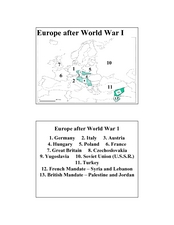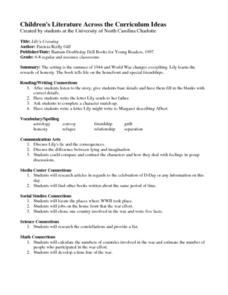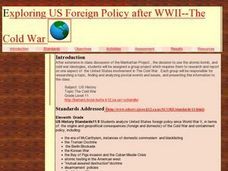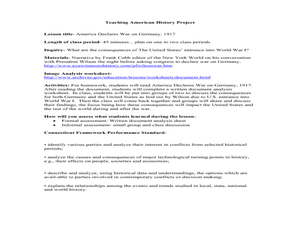National Endowment for the Humanities
People and Places in the North and South
North and South: two opposite directions and two opposite economic and social systems in time of the Civil War. Pupils peruse census websites and primary source photographs to understand what life was like for the everyday person before...
National Endowment for the Humanities
The House Un-American Activities Committee
Was the House Un-American Activities Committee justified in investigating subversive influences in the entertainment industry? Part two of the three-part series of lessons that examine the anti-communism movement after World War II,...
Curated OER
Europe after World War I
In this Europe after World War I map worksheet, young scholars note the 11 regions of the Europe labeled on the map.
Curated OER
Lily's Crossing
Students listen to a story, "Lily's Crossing," about life during a World War. After completing worksheets, they compare and contrast characters in the story. Using math skills, students develop a time line of the war, calculate the...
Curated OER
Images at War
Students examine American attitudes toward war as revealed in Civil War photographs and WWII homefront posters. They analyze and discuss photos, explore the National Archives website, and organize a statement of their findings.
Curated OER
Exploring US Foreign Policy after WWII--The Cold War
Scholars explore U.S. Foreign Policy and Cold War ideologies adopted after WWII. They conduct Internet research on a topic or issue related to the Cold War Era, watch two films, and compose a time line and a multimedia presentation to...
Facing History and Ourselves
Identity and Place
Build scholars' ability to understand their own values and learn about World War II at the same time. Scholars write poetry and discuss identity and place in depth with an in-depth social studies resource.
Maryland Department of Education
The Concept of Identity Lesson 2: The Historical/Biographical Approach
"How does our environment shape our identity?" After researching biographical information about John Knowles and considering how these experiences are reflected in A Separate Peace, class members consider the strengths and weaknesses of...
Curated OER
America Declares War on Germany, 1917
Students explore the reasons that the United States entered World War I. In this World War I lesson, students read "America Declares War on Germany, 1917," and then discuss the consequences for the U.S. entering the war.
Curated OER
War Stories
Students watch the film "The Perilous Fight: America's World War II in Color". Using the film, they work together to develop proper interview questions to use while talking to World War II veterns. After the interview, they research...
Curated OER
Post-War Suburbanization: Causes and Interpretations
In this teaching American history worksheet, students examine a primary source document regarding post-World War II suburbanization. Students discuss their impressions of the document.
Curated OER
South Koreans in the Vietnam War
Young scholars consider why South Koreans fought in the Vietnam War. In this Vietnam War lesson, high schoolers engage in an activity through which they investigate why South Koreans fought in the Vietnam War and how their participation...
Curated OER
The failure of Diplomacy, September-December 1941
Students investigate four main issues of concern between US and Japan prior to US involvement in World War II. In this role play lesson, students will take the role of US and Japanese negotiators trying to find a diplomatic solution to...
Curated OER
Wartime Posters
Learners recognize that, America's eventual involvement in World War II, not everyone initially agreed that intervention was the answer. They conduct research about the political, economic, sociological, and historical factors in the...
Curated OER
America's Economy: Sorrow And Hope
Students discover how Americans found the hope that broke the Great Depression. In this American economics lesson, students watch "America's Economy: Sorrow and Hope." Students then discuss the implications of the depression and...
Curated OER
Atomic Bomb Debate
Students research the decision to end World War II by dropping the atomic bomb. For this world history lesson, students explore information on the atomic bomb and the decision of the tactics to use it. They also watch a video and plan...
Curated OER
The Butterfly
Sixth graders investigate Germany during World War II. In this world history lesson, 6th graders research the Nazi's during World War II writing a summary of what they find after listening to the story known as The Butterfly.
University of California
The End of the Cold War (1979-1991)
Scholars use primary and secondary documents, as well as video evidence, to investigate the end of the Cold War. After completing the final installment of an eight-part series, class members better understand the issues surrounding the...
Stanford University
Civil War Photographs
One of the first photographed images of the Civil War give historians a glimpse of the realities of war. By viewing images from the war—including pictures of those killed in the bloodiest battles—learners experience the war's impact...
Curated OER
The End of WWII and The Beginning of the Cold War
In this end of World War II and Cold War study guide worksheet, high schoolers fill in 44 blanks in a passage with the appropriate words to complete the sentences regarding the time period.
Curated OER
Immigration and Identity
Students will analyze four historical events: The Annexation of U.S. Southwest, The Mexican Revolution, The Great Depression, and World War II. They determine how each event affected immigration to the U.S. from Mexico and Central...
Curated OER
Civil Rights and Casualties of Wartime
Do your historians fully grasp the consequences of being at war? Help them connect past with present through this group research activity, which has students analysing repercussions suffered by citizens of countries in conflict. Students...
Smithsonian Institution
Mobilizing Children
Scholars find out how the government used propaganda to mobilize children to help in the war effort. Lesson exercises include analyzing a quote from Franklin Roosevelt, viewing propaganda images and posters, and participating in a lively...
Curated OER
Maus: Cubing Questioning Strategy
Maus is the text for a postreading activity that has class members using a cubing strategy to analyze, in depth, topics (racism, past and present, forgetting/remembering the Holocaust, representing the Holocaust) associated with Art...

























